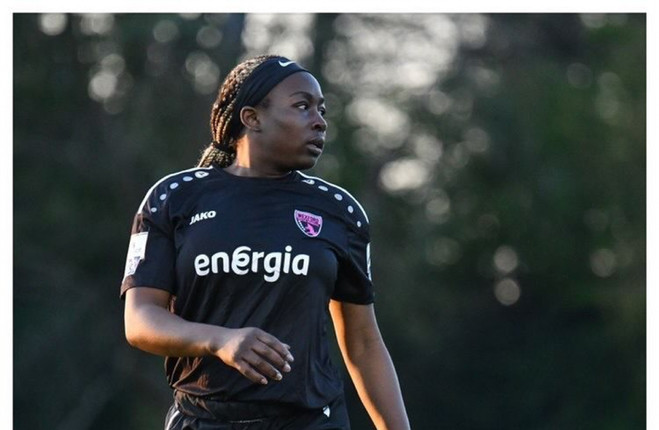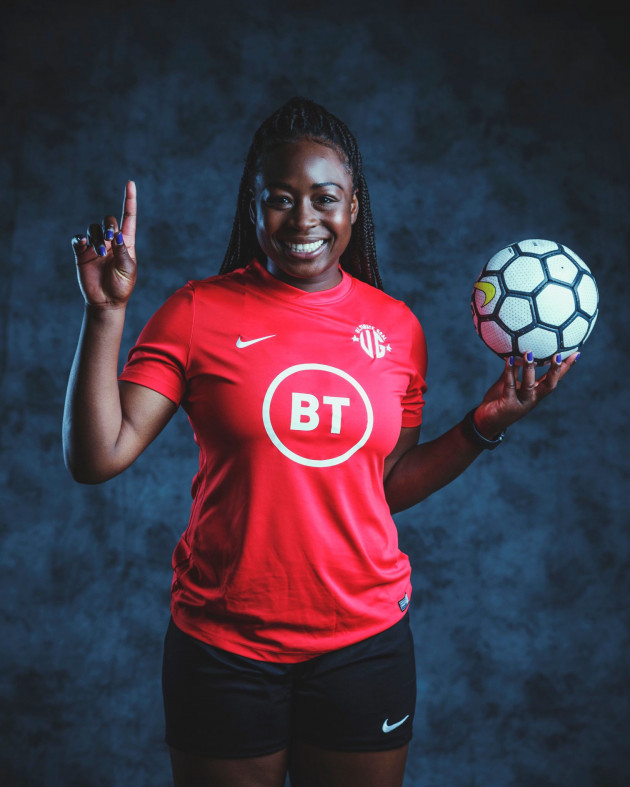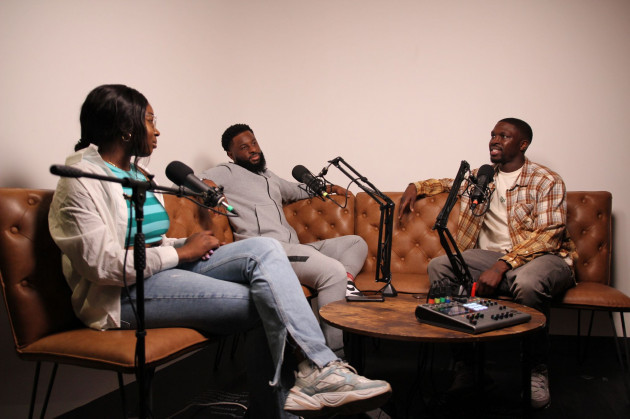IT STARTED just over a year ago.
Between January and March, Vanessa Ogbonna had symptoms of long Covid.
“But they weren’t anything out of the ordinary,” the Wexford Youths player tells The42. “They were just the normal not being able to breathe type thing.
“So they would have been the early signs, but at the time, I think it was just long Covid.”
As the days passed, there were no real signs of improvement.
Nonetheless, the 25-year-old attacker continued her life more or less as normal.
“I didn’t give myself a lot of time to recover because that was the week we were meant to go back to training for the new season. I just took the regular two weeks off for Covid and then I kind of went straight back to it, but I felt a bit of fatigue.
“I was fine most of the time, I would have fatigue and be out of breath, but I just thought that was my immune system recovering. So those would have been the early signs.
“I think it was long Covid initially because I just didn’t give my body a rest and I kept going so that I just pushed my body to the absolute limit.
“Sometimes my leg would swell up, the fatigue would get a bit more than usual where I would literally spend the whole day sleeping or at work just barely doing anything.
“I had a peak in about February, everything started coming back and then in March, it just got worse.”
Around this time, Ogbonna was in England. She had agreed to take part in the BT Sport TV show ‘Ultimate Goal’.
For those unfamiliar with the programme, here is how it’s described per the channel’s official website: “Ultimate Goal sees 31 women from across Europe live and train like professional footballers, as the hopefuls take centre stage at the home of English football, St George’s Park.
“The Ultimate Goal Academy is managed by former Chelsea, Juventus and England star Eni Aluko and Rachel Brown-Finnis – the ex-Liverpool, Everton and England goalkeeper.
“The two managers are assisted by former professionals Mollie and Rosie Kmita (former West Ham United and Tottenham Hotspur players) who serve as team coaches.
“During the series legends of the game including Fara Williams, Rio Ferdinand, Faye White, Freddie Ljungberg, Jens Lehmann, Jill Scott, Peter Crouch and Robin van Persie give the players the benefit of their experience and expertise in unique masterclasses.
“Viewers get to know 11 of the women through in-depth profiles that shine a light on their lives and how they tackle issues such as equality, bereavement, mental health and discrimination.”
“When I signed up for that, I wasn’t too bad,” Ogbonna says. “But it was literally the week before I started getting worse.
“I was just like: ‘It’s only a couple of days. I’ll calm down and I’ll be grand.’”
On her reasons for partaking in the show, Ogbonna adds: “I signed an agent this year because I wanted to move out of Ireland again [having gone to college in America]. I wanted to just play football. Having to work and living in Waterford wasn’t for me.
“It was a good way to get me back into the sphere of elite football, just to evaluate myself and be evaluated. It would have set us at a place to know what my target would have been when looking for clubs and stuff. And even the first day, even though I wasn’t well, I did well.
“Rachel Brown-Finnis was awed that I was a no-brainer the first day. She didn’t really know what was wrong with me. I was fine the first day, and she goes, now I’m a ‘cone,’ I ‘barely move’.
“To be told that you could have made it again, but you’re sick, it’s just my story at this stage. It’s never really the football that’s been stopping me, it’s always external stuff.
“I didn’t find the competition harder than what I’d experienced in Ireland. The level of football in Ireland is very high. And I think the girls have done amazing and we all have done amazing in the country to get football to the level that it is.”
Ogbonna’s worsening condition meant she ultimately had to leave the show. An intense schedule ultimately took its toll.
“The first day I got to England, I could tell that my brain was really off,” she recalls.
“Then after training twice a day for two or three days, on the fourth day, I just clocked out. I couldn’t even train. I wasn’t sleeping or breathing properly. I was even joking with one of the girls, I was on ginger and honey every morning, I was on every med possible.
“The breathing and stuff was normal for just having Covid. But when I started getting the arthritis-y feel in my hands and legs, that week I had swelling in my eyelids as well. So after that, I got home to Ireland and maybe 5-7 days after, I was really tired but thought nothing of it, I was like: ‘Yeah, this has been happening for a couple of months, I’ll just weather the storm again.’
“But usually I get better after a day of not doing anything or elevating my legs or something. And I had a constant low-grade fever, I was just sick basically and my breathing was bad as well. So mum was like: ‘Call the ambulance.’ She was worried that if I was sick, driving myself wasn’t the best solution.”
Ogbonna made this abrupt visit to the hospital at the beginning of June and spent about a week in there.
Eventually, the diagnosis was confirmed — she had lupus.
According to mayoclinic.org: “Lupus is a disease that occurs when your body’s immune system attacks your own tissues and organs (autoimmune disease). Inflammation caused by lupus can affect many different body systems — including your joints, skin, kidneys, blood cells, brain, heart and lungs.
“Lupus can be difficult to diagnose because its signs and symptoms often mimic those of other ailments. The most distinctive sign of lupus — a facial rash that resembles the wings of a butterfly unfolding across both cheeks — occurs in many but not all cases of lupus.
“Some people are born with a tendency toward developing lupus, which may be triggered by infections, certain drugs or even sunlight. While there’s no cure for lupus, treatments can help control symptoms.”
Upon hearing the news, Ogbonna says: “I was kind of confused first of all. But if anything, initially, it was a relief. The only way they could tell was by doing a biopsy.
“It was just frustrating being in there with Covid and stuff, and most people weren’t allowed in. I was in a room with one or two other people or by myself some days, so it wasn’t great. I think initially, I just felt my life was over.
“I had never heard of lupus. It’s a rare disease. But the team that I had were amazing. They reassured me it’s life long but it’s manageable. You figure out what your triggers are whether it’s to do with different activities or whatever, so I could avoid flare-ups.”
Living with the disease means Ogbonna is more vulnerable than most in the era of Covid.
“My immune system already is weakened and I have to be quite careful in getting the vaccine and even the flu vaccine and stuff. Because if I was to get sick, it probably would take a bit longer to deal with that than a regular person.”
As well as the physical toll it took, the psychological impact of having to adapt to this new normal was significant.
Ogbonna has spent the past couple of years playing for Wexford Youths and re-signed for them at the start of the 2021 season.
Now, the player is technically a free agent and admits to being unsure if she will ever return to football owing to her condition.
“The start of the year was horrible for me. Football and just life-wise, having to deal with all that.
“I wasn’t in communication with the Wexford girls for a while because I just couldn’t stand the thought of football. I went to watch them play UCD and I had to leave at half-time because it’s emotional. You want to be out there and you want to be part of it. You don’t join the sport to be on the sideline.
“I’ve really had to re-identify myself and just figure out who I am once again. So obviously being a footballer and striving for these things, my first title is ‘footballer’ and ‘athlete’. The way I live, the way I do everything is done on the basis that I’m an athlete.”
Consequently, Ogonna had to “tap into other things” outside of football and she certainly has plenty of other commitments at present.
Since July 2020, she has hosted the Heyitsmenesser podcast, which is described as “an Irish podcast dedicated to presenting impressive individuals, important topics and creative ideas to you from all over the world”.
The lack of football commitments means she can now travel to places like London to conduct interviews.
Ogbonna coincidentally happened to be recording in Tallaght last month on the same day her Wexford Youths teammates lifted the FAI Cup, but she managed to catch the final online and was delighted to see Stephen Quinn’s side triumph.
And having studied public health in college, Ogbonna is now able to put her degree to good use in her job with a humanitarian company, in the process, moving away from her home in Waterford to live in Dublin.
“I would never have tried to get a job in my field while trying to play football,” she says. “I’m wrecked the whole time. So I think all that energy and all that discipline and passion I have for football, I’ve really just put that into YouTube and the podcast.
“So it’s been really nice in that sense, being able to pour all that energy into something else.”
So the closure of one pathway, at least for now, has led to other openings.
“I’ve been an athlete since I was seven. I haven’t had a proper summer to actually enjoy myself like a normal human being or travel and stuff like that, so it was just nice to do other things as I couldn’t actually pick up a football.”
A key message Ogbonna has taken from the experience is to listen to her body more and not prioritise various commitments over her well-being.
“As an athlete, you’re told to just keep going all the time. You walk things off. You run things off. You keep going. And I think that was the problem. That’s the mentality that got me sick in the first place. If I took a lot longer for my recovery, I most likely wouldn’t have gotten where I was. So I’m not really trying to rush getting back into things.”
The support she has received, Ogbonna adds, has been overwhelming.
“As an athlete, you think you’re doing all these things alone. But when I [consider] my mum, my sister, my brother, my coaches and my friends, other people are giving up things around you and other people are part of your journey as well. You don’t always appreciate that because if you’re not getting played, it’s on you. If you are getting played, the praise is on you. So you almost take everything by yourself.
“But to know the different things that my brother and sister had to give up when I’m being driven around the country: ‘We can’t go for this, because I have something on.’ So to see the commitment my family have made to my success has been overwhelming, and my friends and just people around me. Unfortunately, you have to go through something bad to know how much that you’re really cared for and I wish that didn’t have to be.
“But I remember there was one day where it was call after call after call, I was scared. Why is everyone calling me? It’s nice to see your support system working at that point in time because it’s mentally challenging. I’ve been very vulnerable about it on social media, but that’s the type of person I am. I’m always going to be smiling and cheering, but there are dark times.”
And as difficult as the journey has been on occasion, Ogbonna also says it has strengthened her in certain ways.
“At some stage, I would say that I was having the best and worst time of my life at the same time. It was just something new and I think sometimes you need that to reevaluate your goals and who you are.
“I always knew that I was resilient with all the other stuff that has happened in my life, but you don’t want to learn that you’re resilient. You don’t want to learn how tough you can take it. But I am proud of myself with everything and even just watching it back on Ultimate Goal, I think that’s what put it into perspective for me, knowing that I genuinely could have died and that’s not being dramatic at all. At that time when I was in the hospital, there was fluid in my lungs, fluid around my heart, my kidneys were inflamed. Every organ was not doing its job basically.
“So to know that I pushed as far as I could, I pushed until I couldn’t anymore, it’s definitely character-building and I always see my wins a bit too late and that’s definitely a win that I couldn’t overlook. And I just had to sit on that for a bit.”
And what advice would she give to others in a similar situation?
“I don’t take my religion and faith lightly. There are so many things I’ve gone through and I don’t think I would have gotten to the other side by myself 100%.
“So for me, it would be, trust God if you believe in God. That’s the only thing that got me through. Your friends and family will be there, but most of the time, you’re on your own.
“You’re with your own thoughts and they can be quite heavy. But I think it’s just never giving up. And I know it’s a cliché, but I don’t plan on giving up. And I’m not saying that I’m going to become a professional footballer the second I come back, but I’m going to try. And if I can’t, then I can’t.
“But I don’t want to ever be a certain age and wish that I [tried harder]. I want to leave it all out there. I want to know that I’ve tried my best in this world in everything that I could have done when it comes to football or anything. And to have good people on your journey with you because you can’t do anything in this life alone as much as we try.
“I didn’t think I’d ever say this, but if I do or don’t kick a ball again, I’ve done a lot of things that girls my age haven’t done.
“I’ve played football all over the world and I’ve been able to meet great people and play alongside great people and I don’t think there’s anything that will change that for me. It can’t change that for me. The way I’ve worked and overcome things, the places that I’ve been, I don’t think a disease can overshadow that, so I’m grateful for all of my experiences.
“Especially being an athlete, you’re so engrossed in your journey and how things work out for you, even though it’s a team sport you want to be playing and you want to do this and that, but the world is a lot bigger than me or you or anything else.”
You can follow Vanessa Ogbonna on YouTube here.



